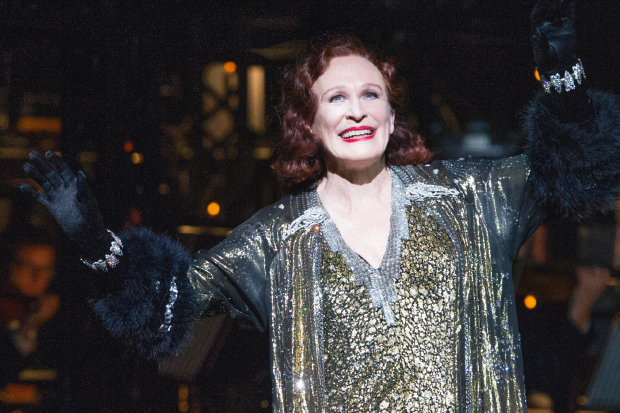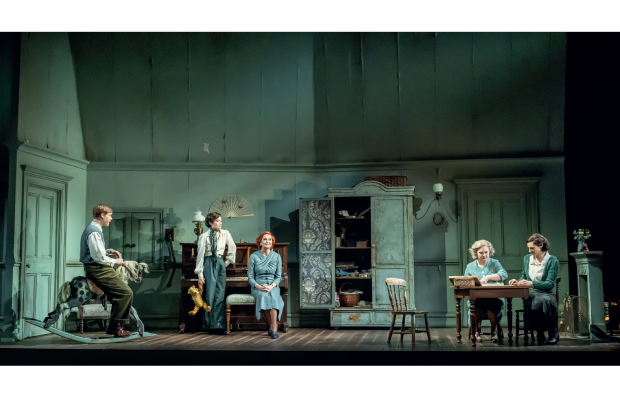Sunset Boulevard is a tale of fractured glory with Homeric dimensions. The movie presents Hollywood as a never-ending Trojan War that attracts fresh generations of dreamy youths in search of conquest and treasure. The lead characters have retired from battle, wounded. Joe Gillis, like Odysseus, is a vagrant warrior ensnared in the island-mansion of Norma Desmond, who plays the role of broken-queen-turned-sorceress. These fabulous elements are preserved in Andrew Lloyd Webber’s musical version. So is the Norma-Joe affair, with its distasteful emotional template: mother-son, boss-slave, mistress-poodle, crone-toyboy. The lovers are linked by nothing but neediness and failure, and each desires the mirage that the other represents. In all, it makes for a dark, unsettling and perfectly humourless story that inexplicably seizes the imagination. Put it this way, I didn’t enjoy it but I couldn’t help loving it.
Visually this production is immaculate. A huge orchestra, seated on stage, is partially concealed beneath a network of intersecting staircases that doubles as the movie lot and as Norma’s sprawling home. Golden lights illuminate the musicians against an azure backdrop that creates the blue-orange formula beloved of unpretentious, crowd-pleasing designers. And the music, though not Lloyd Webber’s finest, is bashed out with faultless efficiency.
The audience seemed to adore Glenn Close (Norma), who has built an astonishing international career from two slender and rather unsavoury film roles (bunny-boiler and Dalmatian-snatcher, is there anything else?). Her stage charisma is impressive. Her warbling? A bit slippery at first, good later, not outstanding. Michael Xavier (Joe) is a handsome slab of tanned beefcake with an attractive voice, nicely trained. The show-stealer is Fred Johanson as the melancholy film director, Max, who sacrifices everything for Norma. The booming sonority of Johanson’s spoken words might have sounded pretentious in an earthier script but his cavernous enunciations seem to suit the pumped-up grandeur of the material. He sings with a lovely fluting tenor, heart-melting in its upper registers, which feels under-used. When the composer sees this version he’ll want to bang out a couple of extra numbers to give Johanson the opportunity he deserves.
Eager crowds toddled along to The Caretaker expecting a hilariously bleak disquisition on loneliness by a theatrical genius. Instead they got The Caretaker. When it opened in 1960, this was an eccentric slice of actionless and meandering miserablism written by a clever young magpie who had plucked Beckett’s clowning tramps from the broken tree stump and dropped them into a Ladbroke Grove garret. My tip is to manage your expectations. If you’re after a masterpiece, you’ll be bored and frustrated. If you’re prepared for a dispiriting snapshot of urban destitution you’ll enjoy the good jokes, of which there are about ten. This isn’t a comedy. It’s a violent and unpleasant soap with flashes of tragic wit.
Timothy Spall plays Davies, an astoundingly dim beggar, who wants to get a job from the brain-damaged Aston and his flash young brother Mick. That’s the plot. Spall’s oddly flamboyant and self-conscious Davies speaks with mock gentility when invoking his posh friends. He’s asked if he’s Welsh and he replies in a Welsh accent. Is that Davies? Davies has the IQ of a mollusc and his intellectual horizons are so circumscribed that he contemplates a visit to Sidcup as if it were a crossing of the Empty Quarter. Spall adds plenty of tricks, grimaces, hand flourishes, shocked pauses, over-extended vowel sounds and choreographed bits of comic business. Robert Morley might have done it like this, but it’s a display that belongs to theatre-land, not bedsit-land. More desolation and emptiness bring out the truth of Davies better. And improve the comedy.
Likewise the garret is too exuberantly bomb-struck. When the characters discuss turning it into a penthouse they get plenty of easy laughs but the authenticity goes missing. Daniel Mays, like Spall, has been scribbling in the margins of his character. He gives Aston a limp, a proto-stammer and a habit of scrunching up his eyes as if squinting under the glare of an interrogator’s spotlight. His suit is far too smart for a jobless outpatient whose sole aim in life is to build a shed from scrap wood. A man who spends a week changing a plug (with the correct pins but the wrong insulating wires for the early 1960s) could never dress himself with such understated elegance. Mick, a straightforward gadabout, works better and yet the lack of subtlety is disappointing. His first long interaction with Davies begins at such a pitch of intensity that it can’t develop and find the many registers it’s capable of touching.
Around me, I have to say, there were adoring playgoers who roared like crazy at the end. I wasn’t convinced. The show has two intervals and two opportunities to reach the bar. That helps.
Got something to add? Join the discussion and comment below.
Get 10 issues for just $10
Subscribe to The Spectator Australia today for the next 10 magazine issues, plus full online access, for just $10.
You might disagree with half of it, but you’ll enjoy reading all of it. Try your first month for free, then just $2 a week for the remainder of your first year.














Comments
Don't miss out
Join the conversation with other Spectator Australia readers. Subscribe to leave a comment.
SUBSCRIBEAlready a subscriber? Log in